During pregnancy, a woman suffers different symptoms and changes in her body due to the hormonal variations that pregnancy entails.
The most common symptom women will notice is the late or missed period, which makes her think of a possible pregnancy. Later, she will begin to notice other physical and emotional symptoms, too.
Throughout this article, we are going to discuss all these signs and symptoms that occur in the mother-to-be during the 3 trimesters of pregnancy.
Provided below is an index with the 6 points we are going to expand on in this article.
- 1.
- 1.1.
- 1.2.
- 1.3.
- 1.4.
- 1.5.
- 1.6.
- 1.7.
- 1.8.
- 2.
- 3.
- 3.1.
- 3.2.
- 3.3.
- 3.4.
- 3.5.
- 3.6.
- 4.
- 5.
- 6.
Major Symptoms of Pregnancy
Knowing the symptoms of possible pregnancy is very important, as it tells you to do a pregnancy test so you can understand why your body is having these reactions.
Indeed, once you discover that you’re pregnant, it is important to make an appointment with the gynecologist to start the pregnancy follow-up.
In addition, the sooner you begin to take care of your health, your diet and take the nutritional supplements indicated by your doctor, the greater the chance that the pregnancy will develop normally.
During the first few weeks of pregnancy, the first signs may appear, such as a slight spotting known as implantation bleeding, breast changes, increased vaginal discharge, and fatigue. Since these first symptoms are usually very similar to those of menstruation, the woman probably won’t yet suspect she is pregnant. After about 15 days, the menstrual period does not come and she can confirm the pregnancy with urine test.
However, many women do not notice anything when embryo implantation occurs, so there is no need to worry if you do not notice any symptoms and you are trying to get pregnant.
In contrast, in the first months of pregnancy and throughout the first trimester, the most frequent bodily symptoms are nausea, extreme breast tenderness, changes in smell, aversion to some foods, and frequent urination. Each of these are detailed below.
Delayed menstruation
The absence of menstruation, also known as amenorrhea, is the most characteristic symptom of pregnancy. Lack of menstruation usually occurs around the fourth week of gestation in all pregnant women.
However, some women experience implantation spotting that can be mistaken for a period. The same is true for women who have irregular menstrual cycles and will not know they are pregnant until they notice other symptoms later on.
Breast changes
At the beginning of pregnancy, you’ll already notice some discomfort in the breasts, although the most important changes appear in the second month of pregnancy.
In general, a woman feels her breasts increase in size, are more sensitive, and the nipple becomes larger and darker. All these symptoms appear due to hormonal changes that stimulate the mammary glands for future lactation.
This symptom can be bothersome and painful, especially when dressing or pressing on the breasts.
Nausea or vomiting
Nausea, or morning sickness, is another of the most characteristic symptoms of the first trimester of pregnancy.
It usually appears after the sixth week of pregnancy, when there is a rapid increase in the hormones estrogen and progesterone.
In most cases, nausea and vomiting occur in the morning, when you have an empty stomach.
In general, this is not a serious symptom unless nausea prevents you from eating and drinking properly.
Changes in smell and appetite
From the second month of pregnancy, it is quite common to experience greater olfactory sensitivity, increased appetite, and food cravings.
You may begin to crave foods that you didn't before, and in the same way, you may have aversion to foods that you once loved.
Strong or unpleasant odors may also increase nausea during the first trimester of pregnancy.
Tiredness and Fatigue
It is also very common for women to feel more tired and lack energy from the second month of pregnancy. Any task that used to be done with complete normality can now be exhausting.
As a consequence, it is also normal to feel sleepy, as the body needs to rest more frequently.
Increased urge to urinate
From the beginning of the pregnancy to the end of it, it is very common for the pregnant woman to feel a greater need to urinate.
The causes of this are hormonal changes that reduce the bladder's ability to empty completely and, later, the increased size of the fetus that will compress the bladder constantly.
This increased urge to urinate could make you get up several times in the night, which would affect your rest and increased fatigue.
Emotional changes
A woman's hormonal situation during pregnancy can also influence her mood, so it is common to have increased sensitivity and irritability, as well as sudden mood swings.
All these symptoms are very general and there are women who experience them with more intensity than others.
Other changes
In addition to all the physical and emotional symptoms discussed so far, pregnancy can give rise to many other symptoms such as the following:
- Back pain
- Headache
- Dizziness
- Constipation
- Heartburn
- Gases
- Acne
- Appearance of spots on the skin
- Stretch marks and spider veins
- Leg cramps
If you wish to obtain more information about the evolution of gestation, we recommend you to visit this article: Pregnancy Stages by month - Fetal Development with pictures.
Second and third trimester symptoms
As the weeks of pregnancy progress, you will begin to feel more changes in your body, above all related to weight gain and volume.
For example, an enlarged belly will lead to more back pain, stretch marks, more urge to urinate, and trouble sleeping.
On the other hand, the unpleasant symptoms of the onset of gestation, such as nausea, disappear from the second trimester and you’ll feel more active.
Another characteristic symptom that occurs from weeks 12-14 of pregnancy is the secretion of colostrum from the breasts.
Colostrum is a thick, yellow substance secreted by the breasts that serve as food for the baby during the first few days of life after birth. Colostrum is therefore the baby´s food while waiting for your milk to come in.
Once the third trimester is over, it is normal for you to feel more tired, have difficulty moving around, and even suffer from insomnia.
Temporary discomforts such as indigestion, heartburn, or mild uterine contractions may also occur.
FAQs from users
When do pregnancy symptoms appear?
Pregnancy symptoms usually appear during the second month of gestation, starting from the fifth week.
It is important to bear in mind that not all women start noticing changes during the first weeks, they can appear later, and that the symptoms vary from one woman to another and even between the different pregnancies of the same woman.
What are the symptoms of a first pregnancy?
Symptoms vary from woman to woman, and between pregnancies, emotional and physical changes may be different. The symptoms mentioned in this article may occur in a first pregnancy or in a later pregnancy. A woman usually has a combination of different symptoms. She does not have to have all of them at the same time.
Are the symptoms of a pregnant woman always the same?
No, they can vary from one pregnancy to another, as well as in intensity. For example, a woman may not notice symptoms during the first trimester (except for the absence of menstruation) of her first pregnancy and instead have a lot of nausea and tiredness in a later one. There is no way to predict what changes a woman will experience or whether they will be more or less intense.
What are the symptoms of pregnancy week to week?
There is no way to indicate the symptoms by weeks, as they may appear earlier or later depending on each woman, and the symptoms are not the same for all women.
The most common symptoms are those listed in this article.
Read more
What symptoms may indicate that there is a complication with the pregnancy?
Risk symptoms are less common throughout pregnancy and can alert a woman that something is wrong. If any of the following symptoms appear, the recommendation is to contact the gynecologist immediately to determine the cause and look for a solution.
- Vaginal bleeding: slight bleeding may be normal, but an abundant one is worrisome as it may be a sign of abortion or ectopic pregnancy.
- Pain or burning when urinating: may be signs of a urinary tract infection.
- acute stomach pain.
- Very severe headache.
- Visual problems.
- Sudden weight gain.
- Hand and face swelling.
- Fever.
Also, don't be alarmed at any unusual or uncommon symptoms. It is important to determine when it is something serious and when it is simply an effect of changes in the body. It is common for first-time pregnant women to see a specialist for any variation or discomfort.
Can men have pregnancy symptoms?
Yes, it is possible for a man to experience what is called empathic pregnancy or Couvade syndrome during his partner's gestation. It comes from the French word couver, which means incubate or create.
Men present symptoms similar to those of women, such as abdominal pain, mood swings, nausea, vomiting, fatigue and weight gain, among others. Symptoms often cease at the time of delivery, so the only cure is the birth of the baby.
Recommended readings
Most of the signs and symptoms of pregnancy make it uncomfortable for the woman and she has to learn to live with these during the 40 weeks of gestation. In the following article we detail these inconvenient symptoms in more detail: Common discomforts during pregnancy.
On another note, the pregnant woman will experience more changes in her body that will be necessary for the birth of the baby and the beginning of breastfeeding: Pregnancy and physiological changes.
We make a great effort to provide you with the highest quality information.
🙏 Please share this article if you liked it. 💜💜 You help us continue!
References
Broussard CN, Richter JE. (1998). Nausea and vomiting of pregnancy. Gastroenterol Clin North Am; 27: 123- 151 (view)
Cerqueira Dapena MJ. (2003). Metabolismo en el embarazo. Modificaciones endocrinas. Modificaciones psíquicas. En: Cabero Roura L (Director). Tratado de Ginecología, Obstetricia y Medicina de la Reproducción. Madrid: Editorial Médica Panamericana
Dickason E, Silverman B, Schult M. (1996). Enfermería maternoinfantil (1.a ed.). Barcelona: Mosby-Doyma Libros.
Emelianova S, Mazzotta P, Einarson A, Koren G. (1999) Prevalence and severity of nausea and vomiting of pregnancy and effect of vitamin supplementation. Clin Invest Med; 22: 106-110.
Eugene S, Bonapace MD, Robert S, Fisher MD. (1998). Constipation and diarrhea in pregnancy. Gastroenterol Clin North Am; 27: 197- 211 (view)
Foxcroft KF, Callaway LK, Byrne NM, Webster J. Development and validation of a pregnancy symptoms inventory. BMC Pregnancy Childbirth. 2013 Jan 16;13:3
Gary F, Mc Donald P. (1996). Adaptación materna al embarazo. En: Gary F, MacDonald P, Grant N Lereso K, Gilstrap L, editores. Williams. Obstetricia (4.a ed.). Barcelona: Masson.
González Merlo J. (1992). Modificaciones fisiológicas producidas en el organismo materno por el embarazo. En: Williams. Obstetricia (4.a ed.). Barcelona: Masón
Grupos de trabajo de la Guía de Embarazo y Parto, Guía de Salud Oral, y Guía de Lactancia Materna. Consejería de Sanidad, Dirección General de Salud Pública y Servicio de Salud del Principado de Asturias. Octubre de 2015 (view)
Lacroix R, Eason E, Melzack R. (2000). Nausea and vomiting during pregnancy: a prospective study of its frequency, intensity, and patterns of change. Am J Obstet Gynecol; 182: 931-937 (view)
Meyer L, Peacock J, Martin J, Anderson R. (1994). Symptoms and health problems in pregnancy: their association with social factors, smoking, alcohol, caffeine and attitude to pregnancy. Pedriatr Perinat Epidemiol; 8: 145-155
Norman RJ, Menabawey M (1987). Relationship between blood and urine concentrations of intact human chorionic gonadotropin and its free subunits in early pregnancy. Obstet Gynecol; 69: 590-593
FAQs from users: 'When do pregnancy symptoms appear?', 'What are the symptoms of a first pregnancy?', 'Are the symptoms of a pregnant woman always the same?', 'What are the symptoms of pregnancy week to week?', 'What symptoms may indicate that there is a complication with the pregnancy?' and 'Can men have pregnancy symptoms?'.
Authors and contributors

More information about Cristina Algarra Goosman

More information about Michelle Lorraine Embleton
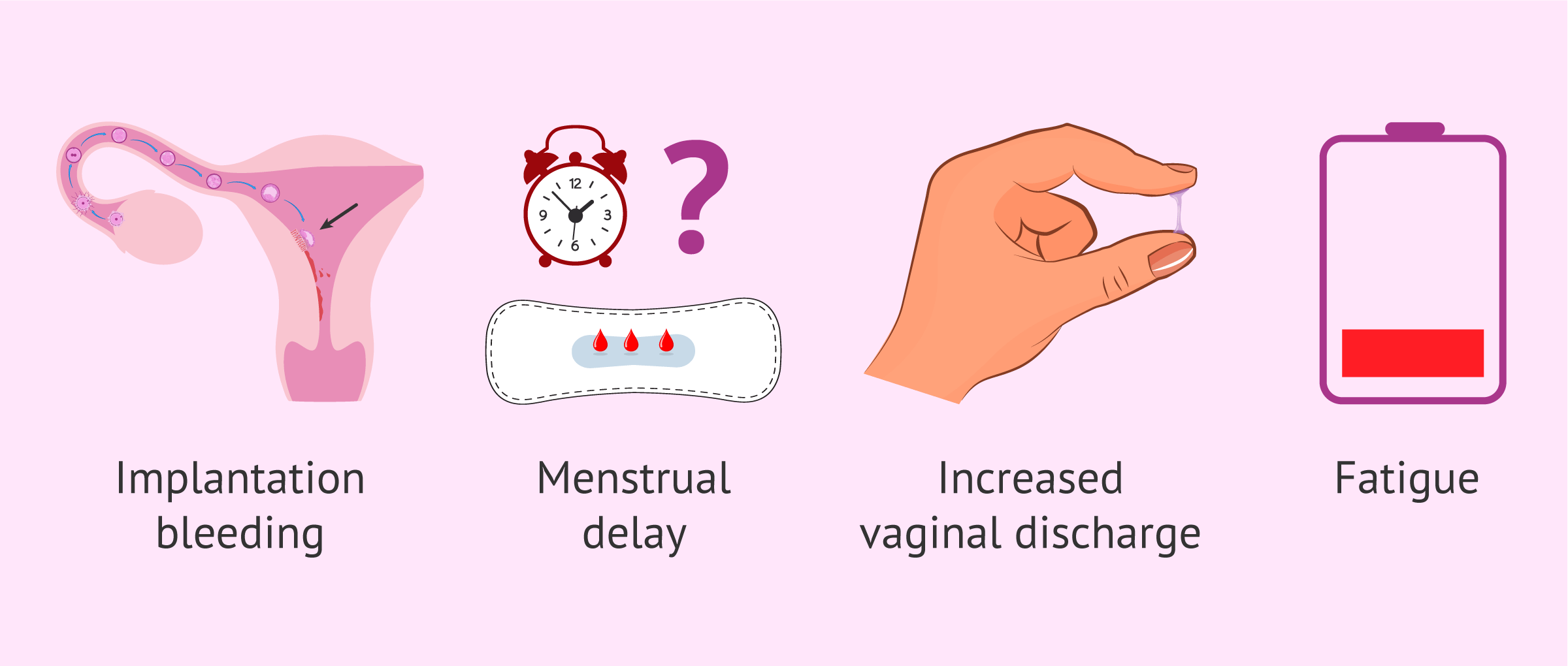

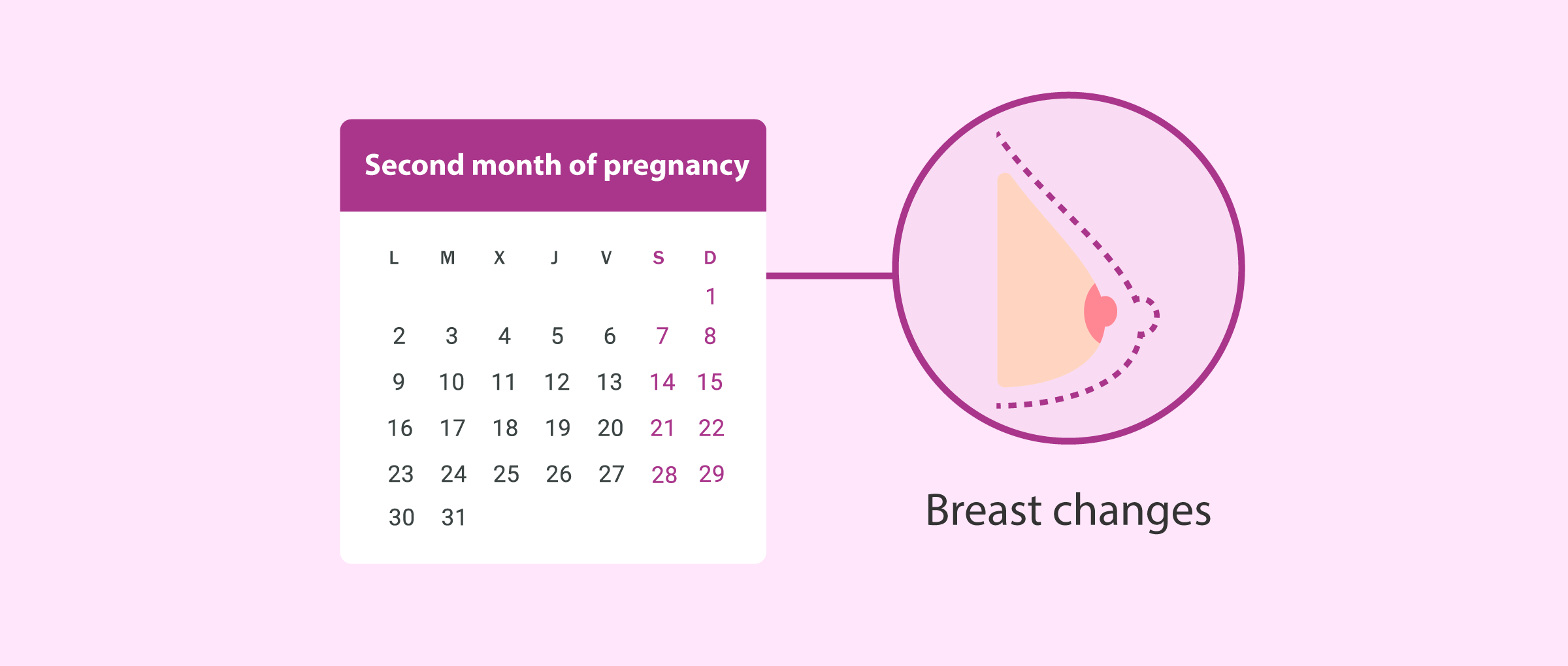

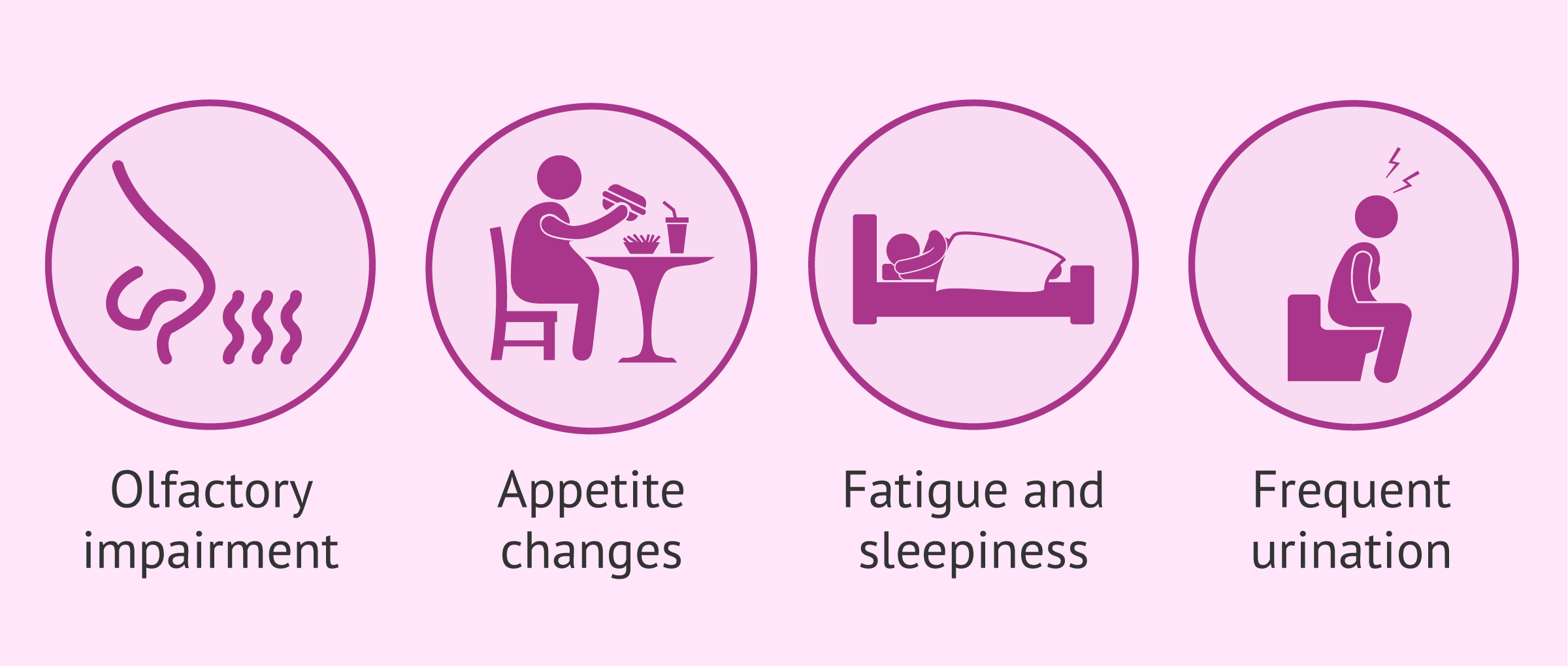
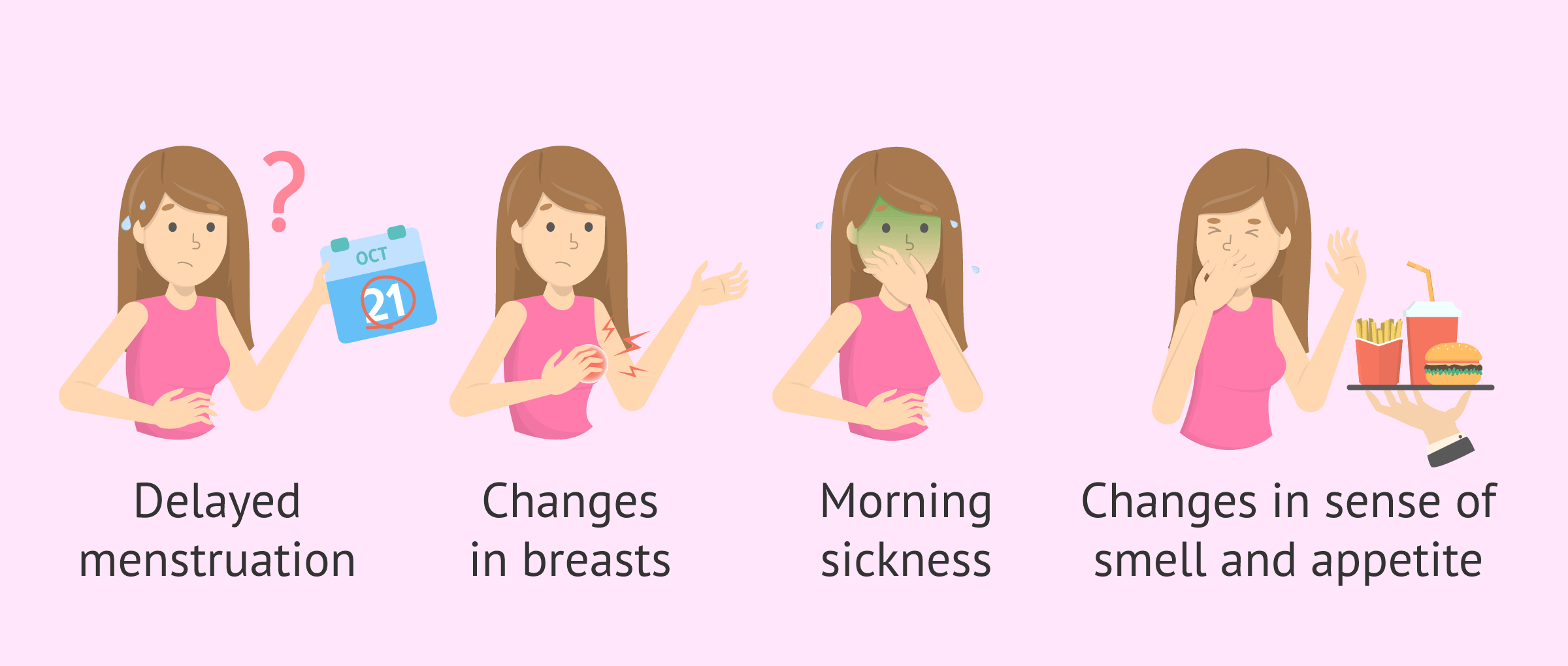
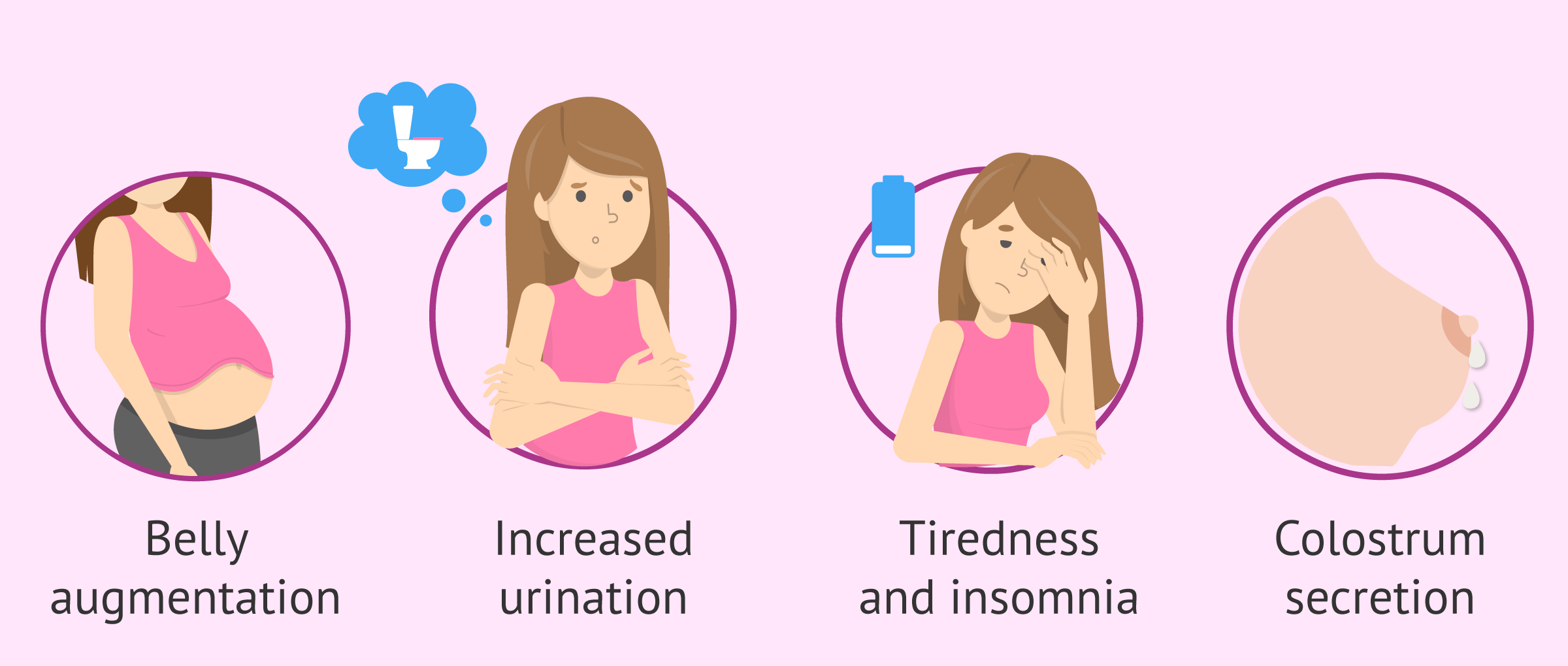




Hi, I am a few days late and have spotted a little, is that my period or could I be pregnant?
Hi KrisKrakowski,
Light spotting two weeks after ovulation may be implantation bleeding, many women mistake this bleeding for a period. It is important to differentiate them by color, duration, and amount.
On the one hand, implantation bleeding usually has a pink or red-brown color. It usually lasts from a few hours to a few days and is accompanied by symptoms of pregnancy.
On the other hand, the period has a more bright red color, lasts 4-7 days, and is accompanied by PMS symptoms.
I hope I have been able to answer your question,
Best regards
Hi, I tested positive two weeks ago and I don’t notice anything, I don’t have any symptoms, am I ok?
Hello Dora,
Every woman reacts in a different way to pregnancy and the most common symptoms are not necessarily the ones that should be present in the first weeks of pregnancy, some women don´t even have pregnancy symptoms.
After a positive pregnancy test, it is necessary to go to the doctor to confirm the pregnancy and perform the first ultrasound to establish that the pregnancy is correctly located in the uterus.
I recommend that you go to your doctor who can confirm the pregnancy and take your pregnancy.
I hope everything goes well,
Best regards